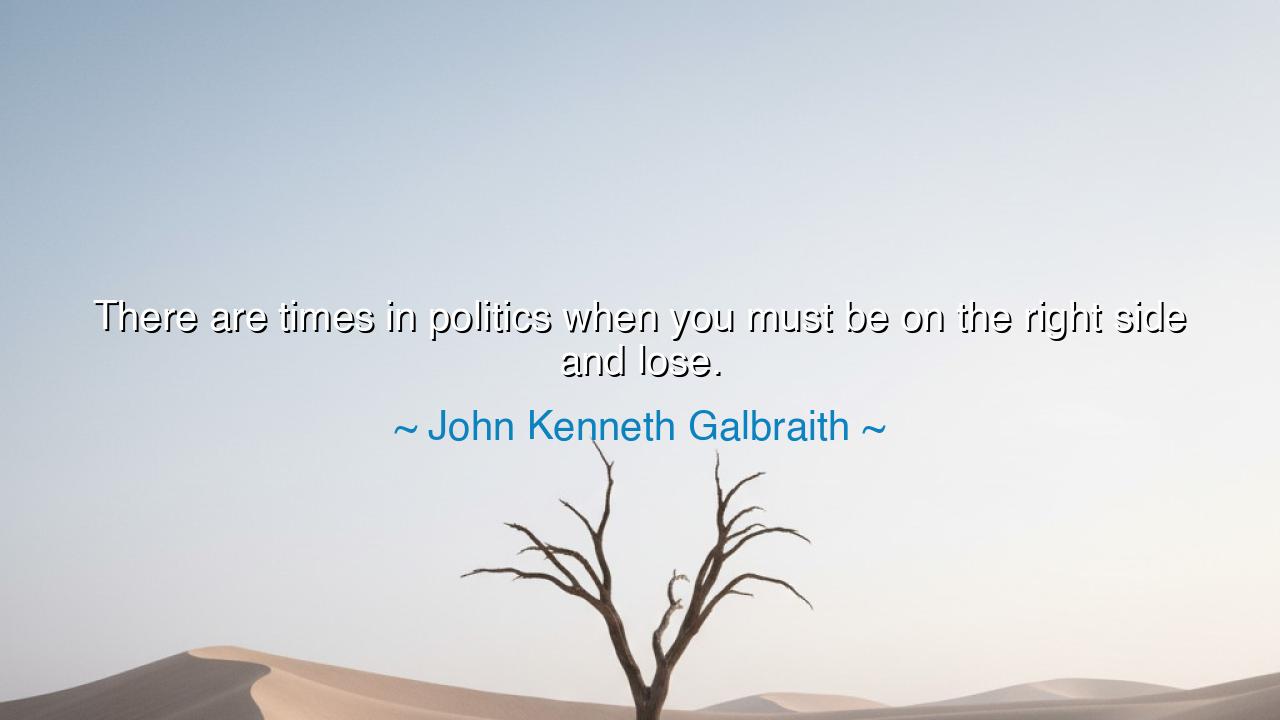
There are times in politics when you must be on the right side






The words of John Kenneth Galbraith, “There are times in politics when you must be on the right side and lose,” shine with the nobility of sacrifice. They remind us that politics, like life itself, is not always about victory, but about fidelity to truth. To stand on the right side is to embrace justice, compassion, and integrity, even when such a stand brings ridicule, defeat, or exile. For the triumph of the moment fades like smoke, but the courage of principle endures across generations.
The ancients knew this truth in their bones. Socrates, offered the chance to escape his death sentence, chose instead to drink the hemlock, preferring to die faithful to his principles than live in betrayal of them. In his loss, he gained a greater immortality than any victory could have granted. His choice embodies Galbraith’s wisdom: that defeat in the name of truth is worth more than victory bought with dishonor.
History bears luminous testimony in the life of Abraham Lincoln before the Civil War. In his early campaigns, he often lost elections because of his opposition to slavery’s expansion. Yet his defeats did not break him, for he chose the right side, even if it cost him advancement. In time, though he lost battles, his integrity forged a path to lead a nation to freedom. His story proves that one may lose in the moment, yet prepare the ground for victory in the ages to come.
Galbraith’s words also stand as a rebuke to those who seek only expediency. The politician who abandons truth for the sake of winning may gain power, but he builds on sand. When storms come, his legacy crumbles. The one who dares to lose for principle, however, builds upon stone. The loss may sting, but history itself will rise to defend his name, while the victories of the faithless vanish into dust.
Let the generations remember: the measure of greatness is not in the fleeting applause of the crowd, but in the steadfastness of conscience. To be on the right side and lose is not failure, but the highest form of honor, for it proves that principle weighed more than ambition. One who stands thus, though defeated in the day, walks in the company of heroes whose names are whispered through eternity.






XMTran Thi Xuan Mai
This quote touches on the idea that political victories aren’t always about being right, but about being part of a larger movement. It makes me wonder if we sometimes fail to recognize the significance of losing for the right reasons. Even when you lose, does standing up for what’s right help pave the way for eventual change? Or do we risk normalizing failure by accepting it too easily in politics?
GDGold D.dragon
It’s frustrating to think about how often politics doesn’t reward doing the right thing. It feels like sometimes, standing firm on moral principles just leads to failure, and yet, the quote suggests that’s still important. But if standing on the right side means constant defeat, is there a point where we should rethink our approach? Should we ever compromise, or is the fight itself the victory?
TDLe Thanh Dat
This quote resonates with me because it speaks to the long-term struggle for justice in politics. There are often moments when doing what is morally right doesn’t lead to immediate victory, but it could set the stage for future change. How do we measure success in those situations? Should we see value in the fight itself, even if we don’t see immediate results, or is the ultimate goal always about winning?
TNbbi thieu nan
This quote seems to acknowledge that politics is often about more than just winning—it’s about standing by principles even when they don’t align with popular opinion. But I also wonder: if you always lose, how effective is that? Does being 'on the right side' matter if it doesn’t change anything? At what point does sticking to your principles become counterproductive?
TZThuyy Zuongg
I understand the sentiment behind this quote, but it raises the question: is it really worth standing on the 'right side' if you know you're going to lose? In politics, how often does losing for the right reasons actually lead to long-term change? Is it possible that, sometimes, it’s more practical to compromise for the sake of progress rather than standing firm on principle and losing in the short term?